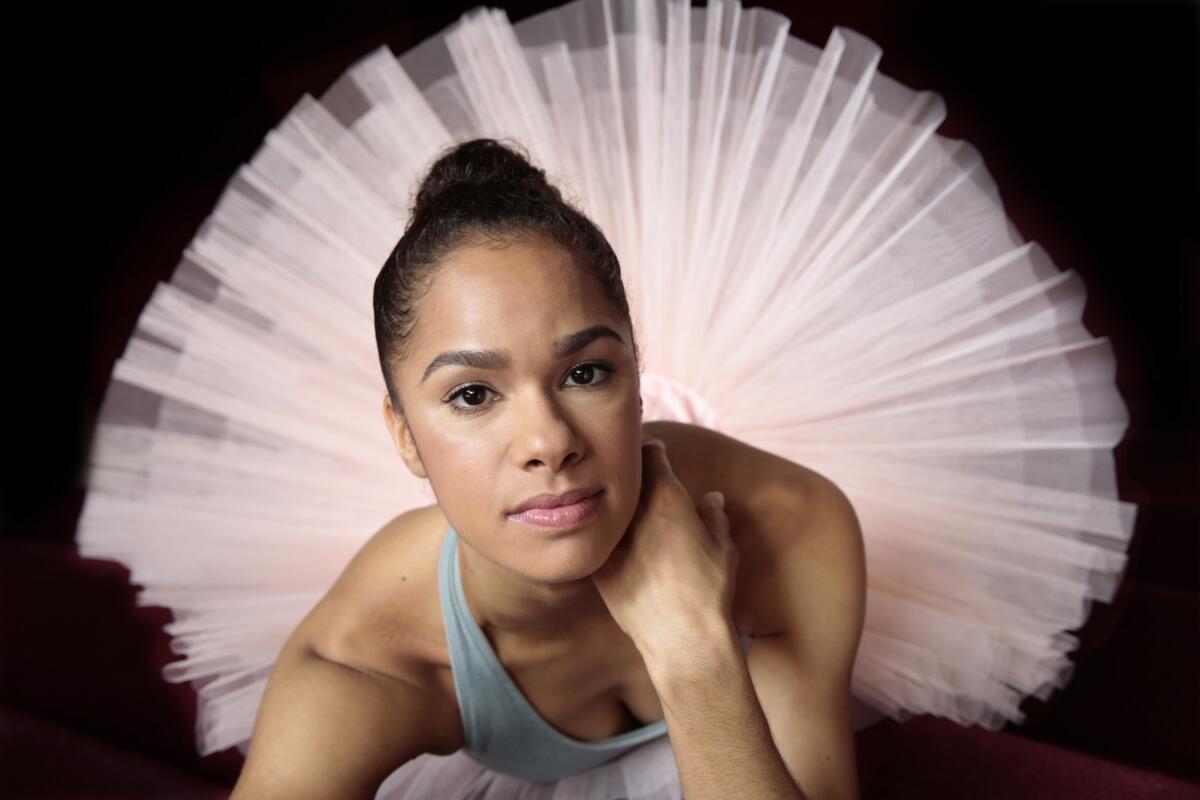Misty Copeland: A trailblazing ballerina makes the judgeâs table

Misty Copeland has her feet in a bucket of ice water. Itâs symbolic of the hard work itâs taken to become not only a prima ballerina in the American Ballet Theater, but also the first African American ballerina in that venerable company to be featured as the lead in âCoppĂŠlia.â Copelandâs ability to continually transcend the dance world will be on display in tonightâs episode, and more upcoming ones, of Foxâs âSo You Think You Can Danceâ -- where she will be a guest judge.
From the custody battles fought for her as she became a well-known teen dance prodigy, to her ascension as the popular Firebird in a reimagining of the 1910 Stravinsky classic âThe Firebird,â Copelandâs rise to the top of the ballet world has been well-documented. A broader opportunity awaits for her and ballet as she joins the popular dance program now in its 11th season. But first, the ice.
What do you do on your Sundays off?
When Iâm in rehearsal season, for some reason it doesnât feel as grueling. Thereâs something extra that we all just attribute to going onstage. Weâre in performance mode at the Metropolitan, and Iâm dead. So Sundays, I just chill out. Iâm probably going to get dragged around by my boyfriend to shop for the apartment. Otherwise, Iâm icing my body and taking care of myself.
What are you working on right now?
Iâll be performing [in a ballet] that was choreographed by George Balanchine called âDuo Concertant.â Itâs a pretty beautiful piece; itâs just me and a partner with a violinist and a pianist on stage. Then I will also dance in George Balanchineâs âThemes and Variationsâ and another old old ballet called âGaĂŽtĂŠ Parisienne.â Thatâs a fun one. Itâs got cancan dancers and itâs set in Paris and itâs really uplifting and exciting. And then it changes every week!
Do you enjoy that switching from week to week or would you rather settle into something?
It definitely makes it more exciting that you donât get complacent in the role that youâre performing because you constantly have to think about what youâre doing to transform into different characters for the different parts. I think the worst part is that when you want to be thinking about the performance that youâre doing that night, youâre rehearsing all day for the ballet youâll be doing next week. You body is just exhausted.
Youâre going to be the first African American ballerina to dance the lead in âCoppĂŠlia.â How does it feel to not only get the lead, but be a âfirstâ?
Itâs very exciting. I work so hard every day. When Iâm given an opportunity like this, performing Swanilda, I really donât step back and look at the picture thinking âOh, Iâm the first.â I get into this little bubble and just try to do my best and completely do all the research I can on the role. It usually doesnât hit me until Iâve performed the part and Iâm looking back on things. That kind of happened when I performed the role of Firebird (in âThe Firebirdâ) ... I was so completely immersed in becoming this character and being the best I could be that none of those things were on my mind. So, Iâm just excited. I actually premiered the role in âCoppĂŠliaâ in Abu Dhabi in April. It was nice to be able to have an opportunity to view it one time outside of New York City because New York City has, I think, the hardest critics. So itâs good to give newer dancers or roles a chance to do it outside of our city first. Iâm excited to share it with New York now.
Speaking of critics, youâre going to be one -- a judge on âSo You Think You Can Dance.â What led to that decision?
They were interested in having me on the show. Nigel [Lythgoe] has always been a huge supporter of American Ballet Theater, and to have him acknowledge the importance of ballet in the dance world is really big. To bring it to a commercial level where it is socially acceptable on a program like âSo You Think You Can Danceâ ... Well, I think itâs about time that we introduce the world to what classical ballet is, and to do it in a fun way. To do it in a way thatâs not intimidating; to not have an old Russian woman on [the show] who has her nose up at the dancers. Someone that I think they can connect with and relate to. So, Iâm happy to be a representative of ballet. For people to be able to turn on the TV in the smallest towns in middle America and learn about classical ballet through that show is pretty awesome.
What kind of judge do you think youâre going to be?
I think itâs really important to have a good balance of things. Dancers are completely used to having criticism -- thatâs why you take classes, to improve and get critiques from teachers. But itâs also still important to get nurtured and get positive feedback. If thereâs not a balance, then thereâs just no point in being a part of it and itâs no longer fun. I really think that I will find a balance of really trying to help and guide them without putting them down in a negative way. I had an opportunity to get my feet wet in Philadelphia when I did one of the auditions. It was a lot more fun than I anticipated, and it was also really cool to connect with these young dancers and to give them real advice that could help them.
Your base of dance, and your past in general, may have helped you develop a thick skin for criticism. Thatâs helped in your career, right?
On a personal level, growing up in the situation I did, constantly struggling and having a single mother with six children, I think all of those things gave me qualities that helped me as a dancer. Thick skin and perseverance to keep striving definitely helped me. Itâs just a hard existence and some people arenât built for it. They may have all the talent in the world but just not have what it takes to make it and be able to cheer yourself on as well as allow others to come in and guide and mentor you.
Youâve already written your memoir, and now you have a childrenâs book coming, too?
The childrenâs book came about before the memoir. It just happened that the memoir went really quickly and the childrenâs book took a little time, but itâs with Christopher Myers -- author and illustator. We really clicked and spent hours talking and bonding over our experiences as African Americans and artists. We just felt it out. So, hanging out with me and one of my mentors, Raven Wilkinson, whoâs a former ballerina in the Ballet Russe, he decided that was what the story was going to be about. A similar relationship to the one that I have with Raven, that mentor-mentee relationship, except that I would be the mentor and it would be a young brown girl whoâs looking up to me. Itâs a really sweet story called âThe Firebird.â
With the book, youâre embracing being a role model ...
Itâs always been something thatâs been easy and natural to me. I was never sat down and told âYou should think about being a mentor.â It just happens that way. I felt a lot of young, especially African American, dancers migrating towards me. Itâs human nature -- you want to go towards something that is similar to you and that feels comfortable to get guidance. And I felt really comfortable giving advice, and it expanded to receiving so many letters and giving advice to young dancers and having personal mentees that I really stay close to and have hands-on experience giving them guidance.
Do you have a favorite dance or character that youâve been?
It changes. I think that when Iâm working on something in that moment, it usually tends to be my favorite. So, right now, Iâm gearing up to play the role of Gamzatti. Sheâs an exotic woman from India who is wealthy and powerful and is dealing with a young water girl who has no money, who has nothing and is trying to steal her man, so thatâs what Iâm focused on right now.
Do you have a favorite dancer or performer that youâve seen come through âSYTYCD?â
I have to say Danny Tidwell. Danny Tidwell was one of my closest friends, actually. He came up through ABT and we were extremely close. Again, being in a company as prestigious as ABT you have about 80 dancers; itâs very rare that you see an African American dancer come through, get into the company, and are extremely gifted, and Danny was one of them. It was incredible for the world to be able to see his gifts.
Do you have a favorite judge, or one whose style you could emulate?
First, I love Mary [Murphy]. It was really awesome ... I met her on the set, but I didnât know what to expect. Sheâs got this bubbly personality and sheâs over-the-top, and I didnât know if that was something that just happened in front of the cameras. But she was always that way. She was very warm and sweet and is exactly how she appears on the show.
Follow Jevon Phillips: @storiz
More to Read
The complete guide to home viewing
Get Screen Gab for everything about the TV shows and streaming movies everyoneâs talking about.
You may occasionally receive promotional content from the Los Angeles Times.







